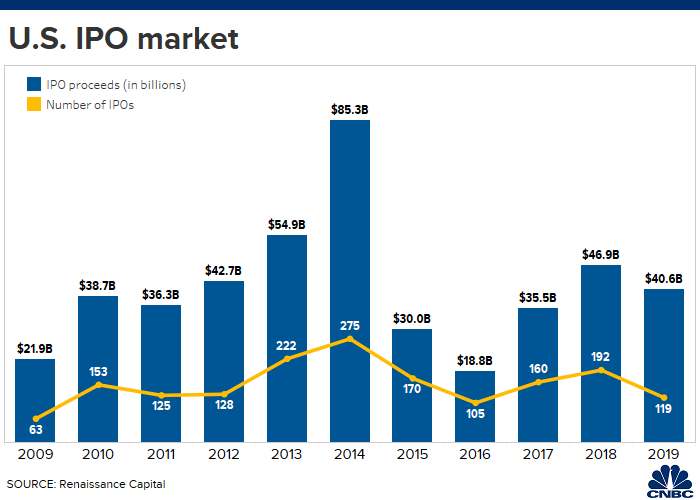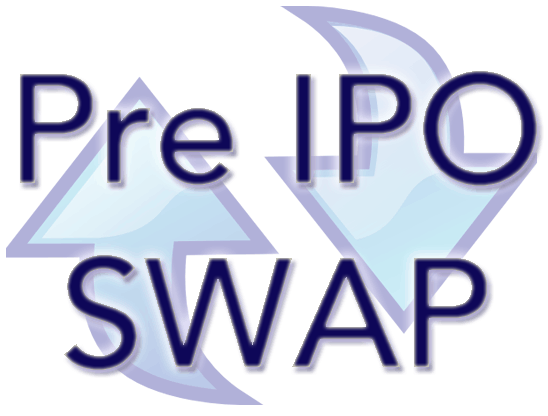- The disappointing IPO season has led some to question the lofty valuations of late-stage private companies ahead of their public debuts.
- Fred Wilson, a VC at Union Square Ventures in New York, wrote a blog post over the weekend that said even though many of these companies use tech, they don’t have the same margins as traditional software companies.
- Now private investors may have to rethink how they value late-stage private companies ahead of an IPO.
As 2019′s IPO class faces a reckoning on the public markets, there are now even more questions about why the private valuations of billion-dollar start-ups have missed the mark.
Fred Wilson, a venture capitalist at Union Square Ventures in New York, summed the problem up in a blog post over the weekend.
I believe that we have seen a narrative in the late stage private markets that as software is eating the world (real estate, music, exercise, transportation), every company should be valued as a software company at 10x revenues or more.
If the product is software and thus can produce software gross margins (75% or greater), then it should be valued as a software company.
If the product is something else and cannot produce software gross margins then it needs to be valued like other similar businesses with similar margins, but maybe at some premium to recognize the leverage it can get through software.
That’s exactly what’s happening to many of the large companies that went public or planned to go public this year. They all have a layer of technology and software integrated into their traditional product offerings, but they don’t have the same margins as a traditional software company. WeWork leases office space. Lyft and Uber provide a car service. Peloton sells pricey exercise bikes and subscriptions for streaming fitness classes. And so on.
On the private markets, the hyper growth of these companies and their promise to disrupt industries with software led to extreme valuations. But then the rationality and skepticism of the public markets kicked in. Uber, which had a private valuation of about $76 billion just before its IPO in May, now has a market cap of about $51 billion. Lyft’s market cap is now about $12 billion, down from its last private valuation of about $15 billion.

And then there’s all the drama surrounding WeWork’s botched IPO as public investors wanted to value the company as low as $10 billion, down from its last private valuation of about $47 billion.
The issue of the lofty private valuations for these tech-infused companies is getting a lot of attention now thanks to the busy IPO season, but there were signs earlier that the public markets don’t have an appetite for these kinds of companies.
Most notably, look a Blue Apron, the meal-kit delivery company/ad sponsor of just about every podcast you listened to between 2014 and 2018. Blue Apron started trading at $10 per share when it went public in 2017 with a market cap of nearly $2 billion. But the share price fell below $1 late last year, and it’s market cap is now just $115 million.
WeWork almost suffered the same fate, before the company and its largest investor SoftBank saw the writing on the wall, as CNBC contributor and CEO of Ritholtz Wealth Management Josh Brown noted on Twitter last week.
There’s a reckoning blooming in Silicon Valley now that several unicorns have failed to wow the public markets the way they did for VCs and private investors. It’s likely why we’ve seen some companies like Palantir and Postmates push back their IPO plans until things settle down or they can figure out a better way to keep their valuations high. (Postmates raised another $225 million earlier this month, even though it was expected to go public this year, for example.)
But Axios business editor Dan Primack was skeptical that the poor performance of recent IPOs will cause much change among the VC crowd, since they’re still attracted to companies with charismatic founders and enticing terms that give them sweet deals for investing.
“It’s not just that many venture capitalists went overboard on ‘founder friendly.’ It’s also that, when push comes to term sheet, few investors will walk over terms if the deal and founder are hot enough. Even if that means lax disclosure and oversight,” Primack wrote in his daily newsletter Monday morning.
As Wilson says in his blog post, the idea that tech and software can provide an advantage is true, but the public markets have proven that it doesn’t justify the massive valuations these companies have gotten privately. Just because a company uses technology doesn’t make it a technology company.
SIGN UP